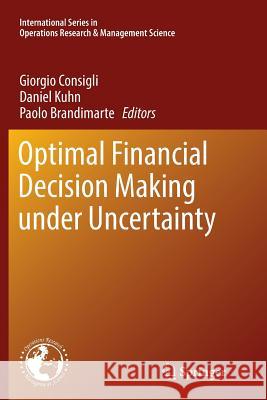Optimal Financial Decision Making Under Uncertainty » książka
topmenu
Optimal Financial Decision Making Under Uncertainty
ISBN-13: 9783319823966 / Angielski / Miękka / 2018 / 298 str.
Kategorie:
Kategorie BISAC:
Wydawca:
Springer
Seria wydawnicza:
Język:
Angielski
ISBN-13:
9783319823966
Rok wydania:
2018
Wydanie:
Softcover Repri
Ilość stron:
298
Waga:
0.45 kg
Wymiary:
23.39 x 15.6 x 1.7
Oprawa:
Miękka
Wolumenów:
01
Dodatkowe informacje:
Wydanie ilustrowane











